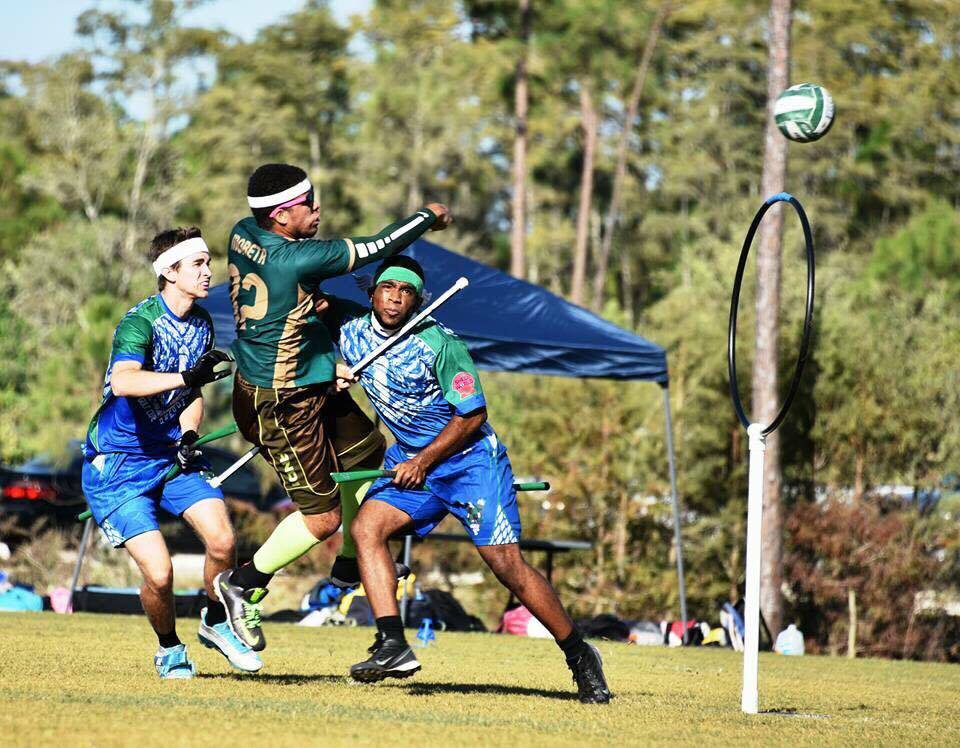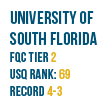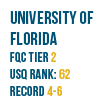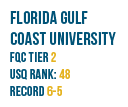Antwerp QC, Much of Belgian Core, Leaves Competitive Quidditch

Credit: Fernando Moreta
Unlike other parts of the country, the sun is shining and quidditch carries on through the “winter” in the Florida Quidditch Conference. The FQC’s 10 member teams have each played a minimum of three games thus far, so we are going to take a look at where they stand on the national scale, as well as where they stack up in the state.

The oldest team in Florida played a total three matches against University of South Florida, University of Miami and Florida International University; all of which were out-of-range losses.
The team has a great number of dedicated players, but seems to be struggling to find an identity with definitive strengths and weaknesses. It also seems to lack overall strategy.
Keep an eye on this squad at the Central Highland Games to see if experience helps the players find their stride.

The Knights have played most Florida teams, but predominantly as an unofficial squad. If the team wants to make waves at the South Regional Championship, it will need to take the next step and start competing as an official team full time.
Similar to Ringling, Central Florida suffers from a lack of definitive identity and has yet to figure out what it’s going to build their strengths upon. Beater Josh Brown is the knight in shining armor for this team and the squad needs to capitalize on his understanding of the game and his aggressive beating style. Brown needs other players to complement his long beats and clean up the plays he can’t finish on his own. Building a strategy around Brown may be enough to propel this team into the next tier.

The highlights of of the notably physical Florida State’s season so far are as follows: a snitch-range win against University of Southern Mississippi, a snitch-range loss to Florida Gulf Coast University (60-90*) and another snitch-range loss to Miami (50-110*). And it may be all downhill from here on out.
The program recently lost utility player Danny Cairo and chaser Shaun Gabrielli to transfers to Florida International. Cairo and Gabrielli contributed on both sides of the ball, playing a physical defense and running a smooth passing offense along with Zenn Perdomo. Cairo also played minutes at beater and seeker, leaving quite a few holes for the team to fill. Additionally, a number of players have quit the team due to internal conflict. Perdomo is now left alone at the helm with mostly inexperienced players.
The team needs to do some heavy recruiting and somehow rebuild mid-season, a major challenge for any squad to overcome.

Speaking of finishing games in snitch range, the Panthers are a whopping 0-3 in games where the snitch catch would decide the winner. The Panthers are still searching for their go-to seeker. Their quaffle game also needs to develop a bit more if they’re to give their star beater, Steven Paisley, a chance to help their seekers out more. The Panthers chasers are very quick, but are still lacking ball movement, as well as physicality. Paisley has shown to be the heart and soul of the squad, playing as the most aggressive beater in the region. He can be seen beating out opponents near their hoops, leaving wide-open lanes for his team’s offense. The addition of player Danny Cairo and Shaun Gabrielli should give them some reliable role players who can fill holes at multiple position. Lastly, the Panthers have continued to practice over winter break, this should give them an advantage at Highland Games making the spring look a little brighter for the young squad.

The South Florida Bulls have been keeping up the same strengths from last season. With a 2-1 record in SWIM situations, Andres Cedeno has proven clutch under pressure. The decision to have him spend more time at seeker and play shorter shifts at chaser has greatly benefitted South Florida.
The Bulls’ offense is and always has been a drive and dish kind. Chaser Gabriel Moreta and keeper Mark Griffin penetrate opposing defenses using speed and strength, and if deep enough, will look to take a shot or dish it off for an alley-oop to Baustin Archie. Occasionally another finisher they have on the wing will be chaser/seeker Andres Cedeño. He’s not playing as many minutes at chaser this season, but is a reliable scorer when the beaters have been taken out of the play. On the defensive side, the team is anchored by third-year beater Austin Webster. Even when the team does not hold bludger control, Webster is able to use the one ball to cover the field as well as any beater, making it difficult for opponents to drive in for goals.
If the Bulls are to finish in the Final Four of the South Regional Championship for a third straight year, their role players will need to step up their game when the starters need a break.

RCQC did not come flying out the gates to kick off the season, but the team has certainly picked things up halfway through. With a third place finish at Swamp Cup IV, RCQC is catching fire at just the right time.
With the new addition of Tevin Foster, the Foxes finally have a true threat at the seeker position, as well as a much needed finisher in to make up for the absence of injured Jonathan Nettles.
RCQC’s offense has also improved from last season. The team utilizes more cuts to the hoops and is not as reliant on fast breaks as it was seasons prior. If RCQC can get healthy for the South Regional Championship, this revamped team will be in strong contention for a spot at US Quidditch Cup 9.

The Florida Gators have seem to hit a plateau at this point in the season. Most of the teams in this tier seem to be on the upswing, but the Gators’ non-core players seem to have hit a wall. The Gators’ offensive output comes from Jimmy Singer as a great driver and bludger deflector, Andrew Monast with alley-oop finishes and Andrew Latham with mid-range shots and the best passes on the team. Kayla Wilson has also come through for this young squad, putting in time at beater and chaser and bringing some much needed physicality. When the big three set of quaffle players are not on the field, the squad seems lost. If this team is to finish with a winning record and a chance at a nationals bid, it will need to spread out its three weapons throughout the roster or make sure that its role players can hold it down when those three are on the sidelines.

The Eagles come off of last season earning the program’s first ever World Cup bid. As it turned out, they were unable to attend due to lack of requirement completion. This season, the Eagles have made sure to cover all their bases. The squad has played every team in this conference except for the Florida Gators and Ringling. It has also shown up with nearly full squads every tournament.
The Eagles’ strategy hinges on their physical defense, not afraid to double or triple team players that drive to the hoops after their beaters are taken out of the play. That physical defense leads to fast-break goals, from which most of their offensive output stems. This defense is also a double edged sword. If teams can manage an extra pass when drawing these double and triple teams, they will take this team out of range in no time.
To succeed at their regional, the Eagles will need to clean things up a bit on defense, as some of their tackles border on the lines of illegality. Cleaner hits paired with improved beating might yield a top tier two Florida Gulf Coast team when the season is over.

Following a team rebuild last season, the Hurricanes have come through as one of the favored to earn a nationals bid in the region. Sean Beloff continues to attack greatly for this team, but suffered a broken jaw at Swamp Cup and it is unclear when he will make his return. With Beloff out, more pressure will be placed on quaffle carriers such as Bernardo Berges.
Berges, however, can handle it. The keeper/chaser has clearly been putting in the work off the field. He is often seen playing the entirety of big-time games without missing a step. He is quickly becoming the best slashing chaser in the region, with cuts in front as well as behind the hoops leading for nice catch-and-shoot goals.
The defense continues to be anchored by Shannon Moorhead, although its physicality could still use some work—it seems as if the defense is too reliant on Moorhead to finish every play.
The Hurricanes’ SWIM play also needs to improve if they are to make some noise at nationals. Miami is 1-4 on the season, and will not be able to outscore every team on the big stage. But if the Hurricanes can clean up their on-snitch play, they will add another weapon to their arsenal and be that much deadlier come April.

The Flamingos are coming off of their first South Regional Championship win and are looking to go back-to-back, having yet to lose to a team in-region. The squad has expanded its one-dimensional offense from last season into a true “team” offense. With their beaters assisting them, the Flamingos can pass a number of times or simply drive in and finish strong. No other players have been doing this as consistently as Tyrell Byrd, who has clearly put in the work off-field and is setting himself apart on both sides of the ball.
The Flamingos will not be playing with their full roster until their regional, so they will have to make sure they do not shy away from the defensive mindset they have been building up to this point. If they can put all the pieces together when the time comes, they will be able to put themselves and the region back on the map come April.
Archives by Month:
- May 2023
- April 2023
- April 2022
- January 2021
- October 2020
- September 2020
- July 2020
- May 2020
- April 2020
- March 2020
- February 2020
- January 2020
- December 2019
- November 2019
- October 2019
- August 2019
- April 2019
- March 2019
- February 2019
- January 2019
- November 2018
- October 2018
- September 2018
- August 2018
- July 2018
- June 2018
- April 2018
- March 2018
- February 2018
- January 2018
- November 2017
- October 2017
- July 2017
- June 2017
- May 2017
- April 2017
- March 2017
- February 2017
- January 2017
- December 2016
- November 2016
- October 2016
- September 2016
- August 2016
- July 2016
- June 2016
- May 2016
- April 2016
- March 2016
- February 2016
- January 2016
- December 2015
- November 2015
- October 2015
- September 2015
- August 2015
- July 2015
- June 2015
- May 2015
- April 2015
- March 2015
- February 2015
- January 2015
- December 2014
- November 2014
- October 2014
- September 2014
- August 2014
- July 2014
- May 2014
- April 2014
- March 2014
- February 2014
- January 2014
- November 2013
- October 2013
- September 2013
- August 2013
- July 2013
- June 2013
- May 2013
- April 2013
- March 2013
- February 2013
- January 2013
- December 2012
- November 2012
- October 2012
Archives by Subject:
- Categories
- Awards
- College/Community Split
- Column
- Community Teams
- Countdown to Columbia
- DIY
- Drills
- Elo Rankings
- Fantasy Fantasy Tournaments
- Game & Tournament Reports
- General
- History Of
- International
- IQA World Cup
- Major League Quidditch
- March Madness
- Matches of the Decade
- Monday Water Cooler
- News
- Positional Strategy
- Press Release
- Profiles
- Quidditch Australia
- Rankings Wrap-Up
- Referees
- Rock Hill Roll Call
- Rules and Policy
- Statistic
- Strategy
- Team Management
- Team USA
- The Pitch
- The Quidditch Lens
- Top 10 College
- Top 10 Community
- Top 20
- Uncategorized
- US Quarantine Cup
- US Quidditch Cup
